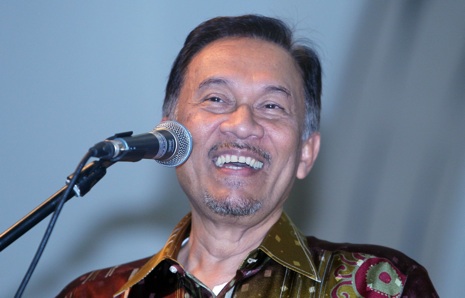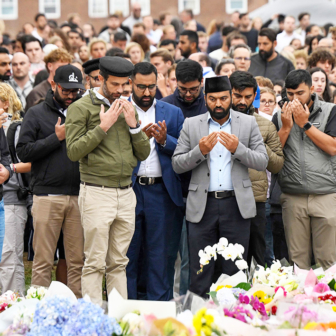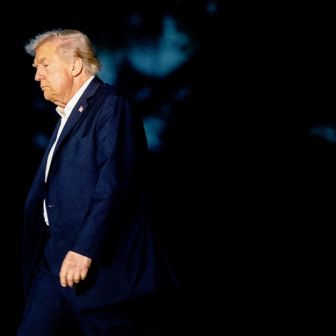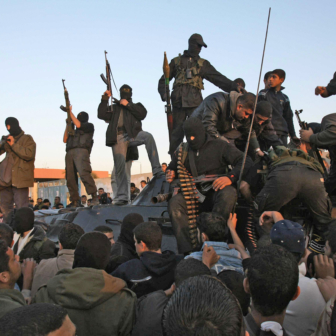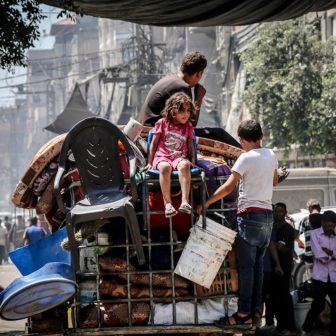IN JUNE this year a group of identically dressed women, all wearing “Free Gaza” headbands, set fire to an Israeli flag in Kota Bharu, capital of Malaysia’s Kelantan state. They were members of the Pan-Malaysian Islamic Party, or PAS – a key component of Malaysia’s opposition alliance, the People’s Pact, which is led by prominent former deputy prime minister Anwar Ibrahim. Their demonstration against the “illegitimate Israeli regime” kicked off the fifty-first annual PAS Congress.
On the same day, members of the PAS Youth Wing assembled to hear a speech by Munir Said from the political bureau of Hamas. As they arrived in the meeting hall, they trampled on images of Israeli and American flags painted on the foyer floor. Inside, Said told his audience that Muslims all over the world must unite to liberate Palestine from Zionist control. The message was clear: Muslims around the world must take up Gaza as their cause.
These pro-Gaza and anti-Israel displays brought a distant event – the violent boarding of the Mavi Marmara by Israeli troops – much closer to millions of Malaysians. This vessel was the flagship of the Freedom Flotilla, a convoy of six ships that attempted to defy Israel’s three-year blockade of Gaza by delivering aid supplies to the occupied territory. Troops killed nine activists on board – all Turkish nationals and members of the Humanitarian Relief Foundation, a Turkish, Islam-oriented non-government organisation.
The killings triggered a flurry of claims and counter-claims, globally coordinated on both sides. The flotilla vessels themselves, which carried 682 activists from forty-two countries, were proof that Gaza solidarity campaigns attract Islam-oriented activists from far and wide. These activists include members of NGOs and charities in Turkey, Jordan, Yemen, Oman, Bahrain, Azerbaijan, Indonesia, Pakistan, Algeria, Morocco, Mauritania and Malaysia.
In its analysis of the flotilla the western media focused most closely on Turkey. The Turkish government itself made a public stand, lauding returned flotilla activists and expressing its outrage over the killing of “martyrs” on board. Since the Mavi Marmara deaths, commentators have observed that Turkey’s foreign policy is increasingly oriented towards gestures of global Islamic solidarity. Could the Turkish government, under the Islamist Justice and Development Party, be leading its nation’s departure from the west?
But these gestures were not only being made by Turkish politicians. In Malaysia too, politicians invested heavily in the protest, most of them in language inflected by Islam rather than the old idioms of national liberation and Third World unity. Indeed, in Malaysia, questions of rights, justice and sympathy with Palestinians are usually framed in terms of what might be called “ummatic globalism” – an effort to activate the ummah, or worldwide community of believers, as a purposeful and united political agent. Malaysian politicians of every stripe now use Gaza to demonstrate this globalism and their support for the political formation it both imagines and produces, “the Muslim World.”
In Malaysia public debate before and since the flotilla has both fed into and reflected the domestic electoral contest. Not only were PAS and the People’s Pact condemning Israel in June, so too was the government. Just a few days before the PAS Congress, the prime minister, Najib Razak, welcomed home activists who had been aboard the Freedom Flotilla – twelve on the Mavi Marmara and six on another ship, the Rachel Corrie. These activists were feted in the media, which discussed their love for Gaza, the bloodstained clothes they brought home, and the fear they felt while briefly in Israeli detention.
Gaza has become embedded in actions, practices and statements that suggest to Malaysians that the ummah is watching, assessing their gestures of religious and political credibility. Indeed, Gaza is now such a potent symbol on Malaysia’s global map of Islam that one parliamentarian recently referred to it as “an exalted place after Mecca and Medina.” The Muslim World isn’t just a creation of Orientalist westerners; in Malaysia, it is produced and perpetuated in countless statements and gestures by politicians, both nationally and ly.
Performing to both audiences, Malaysia made a large contribution to the Freedom Flotilla by backing the Rachel Corrie, a converted merchant ship. Named after a young American activist killed by an Israeli bulldozer while protesting at house demolitions in Gaza, the vessel lagged several days behind the main flotilla because of engine trouble. It was intercepted off the Gaza coast, without violence, and directed to dock at Ashdod in Israel, where its crew of activists was offloaded, detained and processed for deportation.
The voyage was funded by a Malaysian NGO whose patronage profile links it directly to the Malaysian establishment. Called the Perdana Global Peace Organisation, the NGO’s main patron is former prime minister Mahathir Mohamad. The architect of Malaysia’s political Islamisation, Mahathir used religion domestically to appropriate the legitimacy of non-government Islamist groups. He also gave the Palestine Liberation Organisation full diplomatic status in 1981, and Gaza solidarity has been central to the political contest in Malaysia ever since. Perdana lists among its advisers one Mukhriz Mahathir – Mahathir’s son and the current deputy minister for trade and industry in the national government.
With patrons like this, the organisation’s fundraising capacity is enormous. It raised €300,000 for the Rachel Corrie’s voyage and also funded two other ships that didn’t end up travelling. It also has access to government support – for example, through official lobbying of Egypt to allow the unimpeded passage of aid convoys through its Rafah crossing into Gaza.
The volunteers aboard the Rachel Corrie reflected these close government ties. They included Shamsul Akmar Musa Kamal, a former assistant political editor for the New Straits Times, Malaysia’s leading English-language broadsheet, and now a special officer to Mahathir; Matthias Chang, a barrister and one-time Mahathir political secretary; Ahmad Faizal Azumu, once a youth wing leader of the main party in the government coalition; and Muhammad Nizar Zakaria, a federal MP in the current government. Some opposition PAS volunteers were also on board, however, including Abdul Rani Osman, a member of the Selangor state legislative assembly.
Naturally, not all of the Malaysian volunteers were politicians or current and former political staffers. A number of Islam-oriented professional organisations, NGOs and charities were also represented. Nor has the Freedom Flotilla been the only instance in which Malaysian activists have attempted to break the Gaza blockade. In August this year, further attempts were made by two more delegations – the Ramadan March for Freedom and a group of thirty medical practitioners coordinated by the Malaysian Red Crescent Society. Only last month, fourteen Malaysians also joined the fifth Viva Palestina convoy, which successfully entered Gaza through Rafah.
WHY did the Malaysian government pour so much political capital into the Freedom Flotilla? And why did opposition parties ensure they were also represented on board?
One reason is that gestures like these are felt to create important leverage with the Muslim community. Like Turkey, but on a smaller scale, Malaysia’s actions demonstrate that the Gaza cause is valued by non-Arab states seeking a greater speaking part on Islam’s global stage. During a speech before the United Nations General Assembly in September, for example, Prime Minister Najib Razak referred explicitly and at length to the military boarding of the Freedom Flotilla. Earlier, in June, his government called for action against Israel through the Organisation of the Islamic Conference, in which Malaysia is an active and committed participant.
The second reason is that Gaza solidarity gestures provide each side in Malaysian politics with countless political opportunities. Politicians use Gaza to argue to the Malaysian public that they are better Muslims and greater globalists than their opponents. For this reason, the Freedom Flotilla was also drawn in to a government narrative against the opposition People’s Pact leader, Anwar Ibrahim.
This narrative began to unfold in February this year, when Anwar launched an media campaign to highlight his second and ongoing trial on charges of sodomy – charges designed to ruin his moral credibility with Malay Muslims, Malaysia’s majority electoral constituency. International media sources took up his story, and he was lauded in a Washington Post editorial and also interviewed by the Guardian and CNN.
But the government also seeks positive coverage, in part through public affairs consultant APCO International, which promotes Malaysia’s democratic institutions, capacity for service delivery and economic success. Hired in 2009, APCO quickly established a new office in Kuala Lumpur, announcing that it would “provide support” to the Malaysian ambassador in his work in the United States.
On his return from overseas in March, Anwar attacked the government’s connection with APCO. He compared the government’s “One Malaysia” campaign – intended to promote racial harmony in multi-ethnic Malaysia – with an Israeli government campaign called “One Israel.” He accused APCO of creating that campaign for the former Israeli prime minister, Ehud Barak. The government responded by attacking Anwar’s friendship with Paul Wolfowitz, a leading American neoconservative and supporter of Israel. It targeted Anwar’s connection with the Brookings Institution and the National Endowment for Democracy, both seen as Israel-friendly organisations. It also referred Anwar to the Parliamentary Rights and Privileges Committee, accusing him of misleading the house over APCO. (If censured, he could have been suspended from parliament for a year.)
Opposition spokespeople then lined up behind Anwar to accuse APCO of possessing links with Mossad; its access to Malaysian government documents, they argued, should therefore be blocked. Meanwhile, APCO’s assistance reportedly gained Prime Minister Najib a meeting with Barack Obama at a summit on nuclear security, leading Anwar to accuse the government of softening its criticism of the United States and Israel under APCO’s influence.
The accusations continued until the situation suddenly shifted, and Anwar’s side lost control of the argument. In an important by-election, Anwar’s public posturing around the APCO issue failed to shift Malay Muslim votes away from the government over to his side. Then the New Ledger, a right-leaning American website, suddenly published an article attacking Anwar. It accused him of having used the APCO controversy to spin a conspiracy theory about Jews, stoking anti-Semitism at home while posing as a democrat overseas. B’nai Brith, an Jewish organisation, wrote to the US Congress Committee on Foreign Relations accusing Anwar of anti-Semitism. Anwar denied this charge and instead blamed APCO for organising the criticism.
In the middle of all this, the Mavi Marmara was boarded. Malaysian politicians quickly condemned the United States, leading competing protest rallies outside the US embassy in Kuala Lumpur. (There is no Israeli embassy; Malaysia has no diplomatic ties with Israel.) A government-linked NGO, Perkasa, rallied first; opposition representatives and supporters rallied soon after. Anwar’s side won the numbers game – the People’s Pact and a coalition of NGOs managed to stage a rally of 10,000, which marched from a downtown Kuala Lumpur mosque to the US embassy. Here, too, an Israeli flag was burnt – or, more accurately, melted – and demonstrators carried portraits of Hamas leaders Khaled Mashaal and Ismail Haniyeh. After submitting a memorandum to the ambassador, Anwar addressed the crowd, which chanted “Down with Zionists!” and “Accursed Jews!”
In parliament, the government’s efforts to reclaim the Gaza issue were met with chants of “APCO!” from the opposition benches. Yet the taunts were futile: only the government could organise a homecoming for the Freedom Flotilla volunteers. They were greeted in Istanbul by the foreign minister himself, before being escorted back to Malaysia. The deputy prime minister greeted them at the airport, and Najib wore a Palestinian scarf. Pictures were broadcast globally by Al Jazeera’s Malaysia bureau.
This round in the Malaysian Gaza contest then drew to a close. Anwar’s parliamentary committee hearing was postponed indefinitely, and Anwar apologised to his overseas associates for using terms like “Zionist aggression.” This drew taunts from government politicians for apologising to Americans. In turn, the government, apparently satisfied with its success, has renewed APCO’s contract for another year. Meanwhile, in Malaysia as in Turkey, Gaza allows the political contest to continue referencing two audiences: the domestic Muslim public and also the Muslim World. •
